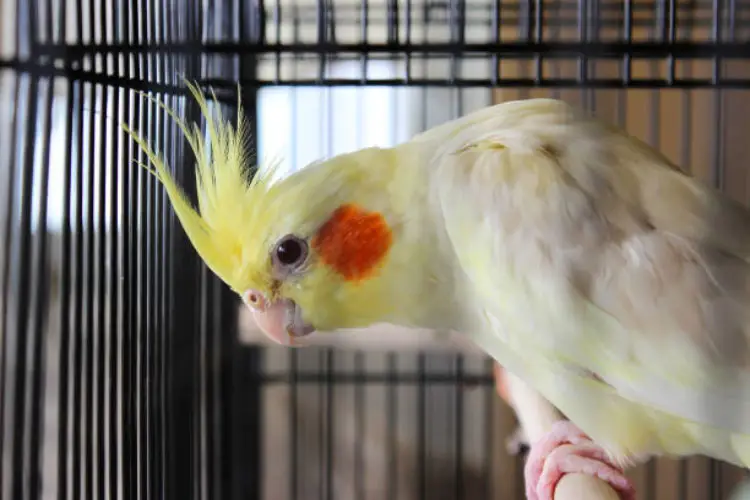Coughing is a reflex action that humans and animals do to clear their airways of irritants. Birds like cockatiels can also cough, which most times worries their new owners. One is left wondering about the possible causes and triggers could be.
So, why is my cockatiel coughing? While cockatiel coughs can have many reasons, they often symptomize a respiratory infection in the breathing system. Other symptoms like sneezing and wheezing are also used to determine the exact reason for a cough. Take your pet to a vet for a diagnosis.
While some coughs might be to clear dust from breathing systems, some can be symptoms of a fatal disease. Read on to learn more reasons for a cockatiel’s cough, treatment, and prevention tips.
Why Is My Cockatiel Coughing?
Sometimes you will notice your little feathered friend coughing. Their coughs are not loud, and often the owner must be attentive to catch one. The bird’s head jerks slightly forward when coughing, and the cough sounds more like a clucking sound. Since cockatiels are capable of mimicry, if their cough sound resembles that of humans, it might be mimicking you when you are coughing.
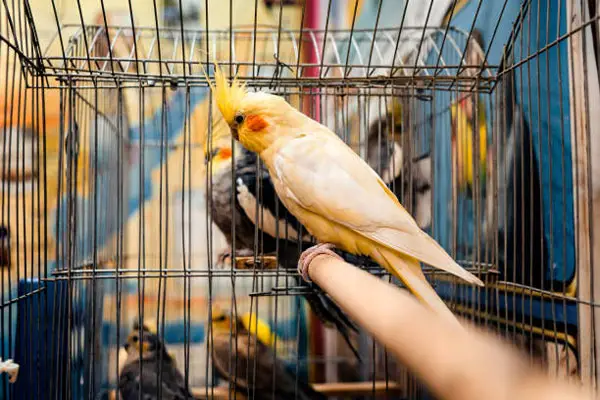
If the cough is genuine, the following are common reasons why your cockatiel is coughing.
1. Dusty Environment
Like humans, birds can breathe and be affected by dust particles in the air. Though they have a mucus membrane that traps most of the dust particles, too much dust can get through. A dirty or poorly ventilated room can sum up too much dust to cause your bird to cough.
2. Irritants In the Air
Strong detergents and perfumes can irritate your cockatiel and cause respiratory problems. Though the first sign of irritation is sneezing, with time, the bird coughs too. Mostly this happens when you clean their cage with home-cleaning products. Air fresheners and other products containing volatile organic compounds.
3. Feather Dust
Like most birds, cockatiels have white powdery dust that keeps the feathers soft and silky. This dust falls off as the birds preen, especially during the molting season when they’re about to lose their feathers. If your bird is in a poorly ventilated room, this dust can affect them and cause a cough.
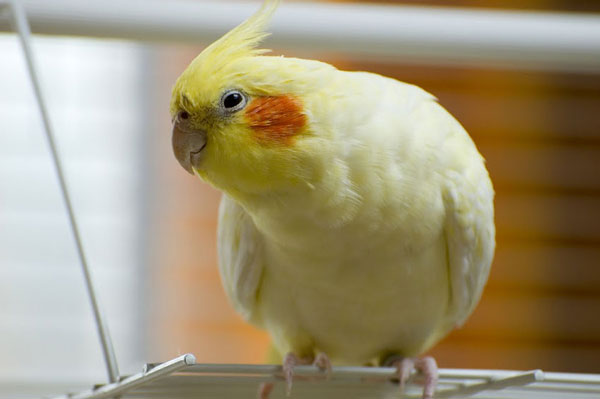
4. Respiratory infection
Coughs can be a result of respiratory infections like aspergillosis, which is a fungal infection. A cough that signifies a respiratory disease is accompanied by other symptoms like difficulties in breathing, and sometimes watery eyes. Your cockatiel coughs can also be a sign of avian flu.
5. Obstructed windpipe
Cockatiels can swallow larger objects that sometimes get stuck on their windpipes. The bird will cough when attempting to regurgitate an object stuck in its windpipe. The bird will also wheeze and have difficulty breathing.
After ascertaining that indeed your cockatiel is coughing and it’s no mimicry, the cause could be one of the factors we have listed above. The best way to handle this is engaging your vet for diagnosis. The best thing about involving a professional is that you don’t second-guess. Instead, you identify the cause and get the right treatment for the condition, which minimizes the chances of losing your bird.
How Do You Treat Cockatiel Coughs?
Most causes of a bird cough are environmentally related and soon disappear as your bird improves. However, more serious ones will require medications and treatment to cure. After noticing your bird coughs and does so regularly, the first step should be contacting an avian veterinarian. The vet can do an avian diagnostic endoscopy to diagnose and learn the reason for the cough.
If your bird is diagnosed with a respiratory tract infection, treatments include medication using antifungal drugs or antibacterial medications for respective infections. The drug can be injected or orally given in drinking water. Unfortunately, there are no readily available treatments for avian influenza for birds, and you must contact your local health agency if your bird is diagnosed with influenza.
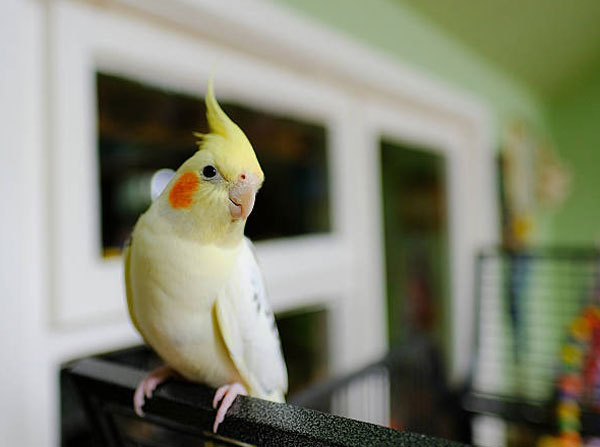
Sometimes, flushing the bird’s sinuses can also improve and treat a cough, though only if necessary. The veterinarians do the flash using saline by pushing it through the nostrils using a syringe. Some other home remedies, like using uncovered water bowls in the bird’s room, can improve most respiratory complications.
What Are the Tips to Prevent Issues Triggering Coughs in Your Cockatiel?
Since some reasons causing the bird to cough are lethal, prevention is crucial. It not only saves you diagnosis and treatment money, but also prevents your bird from a life-threatening disease. However, most owners are sometimes fooled by their bird’s mimicry into thinking they’re sick.
Bond with your pet to learn most of the sounds they make so as not to confuse them. Also, teach your feathered friend other interesting words to say to you. Here are some preventive measures that will help you avert factors causing coughs.
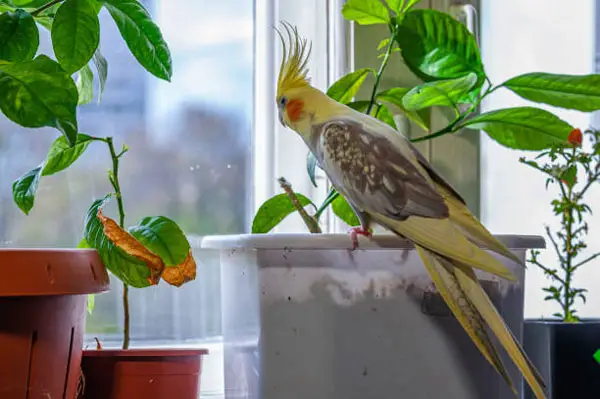
1. Ensure a dust-free environment
A dusty bird room doesn’t only affect pet birds but also the owner. Regularly clean after your pet bird to reduce dust particles in their room. Dirt can also attract pests that can infest your bird and cause diseases.
2. Ensure uncompromised air quality
Most times, coughing is a result of dry air in the bird’s room. Improve airflow and air quality in the room to minimize dry air and keep air circulation. Sometimes, some bird owners will take their birds to the bathroom so that the steam clears their nostrils.
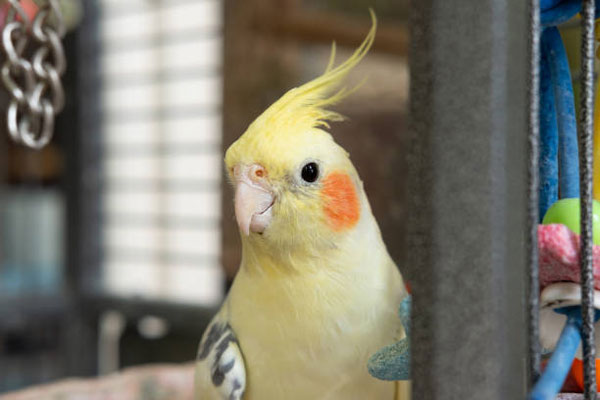
3. Use unscented detergents
Avoid scented detergents and fragrances that have a strong scent in a room where your cockatiel’s cage is. If you don’t like other detergents and must use the strong types, avoid cleaning the pet’s cage and toys with them. Some detergents don’t only cause breathing problems but also are toxic and could cause problems if ingested.
4. Buy safe toys
Birds don’t only play with their toys but also chew on them. Avoid small toys or items the bird can swallow since most can be stuck in their throat. Also, cockatiels sometimes chew on other things in the room besides their toys, and some are harmful and can choke them.
5. Avoid infected Birds
Some infections and diseases causing your bird coughs are transmitted from one bird to another. Avoid interacting with infected birds, especially with avian influenza, as they can infect your birds. Also, if any of your birds have an infection, quarantine it away from others to minimize spreading.
If you ever have to quarantine a sick bird, remember to take proper care of it lest it falls into distress. Take quality time to feed it and keep it company. You don’t want your sick bird to get lonely and lose it because of neglect.
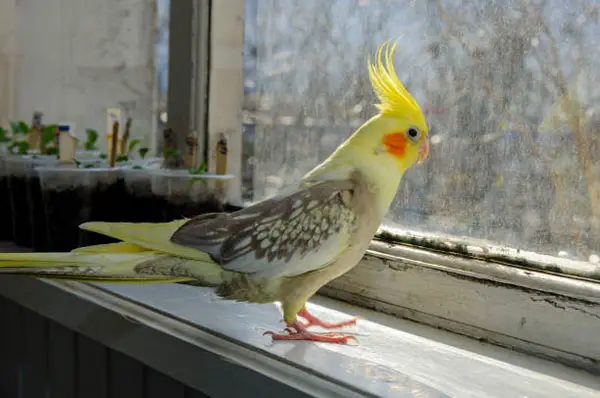
But, remember to be careful not to carry the infection from the affected bird despite quarantining it. The most effective way to do this is to use a disinfectant. If it’s the same person handling birds in all the cages, ensure you disinfect every time as you leave one cage to the other. Other measures you should take include;
- Exercising good hygiene
- Allowing birds out for fresh air when the climate is favorable
- Keeping the birds in spacious cages to avoid stress
- Offering all the birds a good, well-balanced diet
- Ensuring proper ventilation in your cockatiels’ cage
Related Questions
It feels bad when your bird starts coughing and you watch them helplessly. Sometimes you may feel like you’re not doing enough, triggering a lot of questions. Below are the frequently asked questions related to this subject and their well-researched answers.
If you notice your bird coughing, observe closely for other symptoms like sneezing, wheezing, or nasal discharge. Sometimes the bird might be choking on small toys or having a more serious respiratory infection. Since you might not be able to perform a complete diagnosis, you should call your avian vet.
Most times, coughing can symptomize an underlying respiratory disease. Common respiratory diseases include aspergillosis, and avian influenza, whose early signs also include difficulty breathing. However, to distinctively tell the respiratory infection, an avian vet must conduct tests.
Birds, including cockatiels, can get a cough but not often the same as humans. While humans might be coughing just because of dust, cockatiels might be symptomizing respiratory disease. The bird’s cough is merely a chirp, and if it sounds more like that of humans, it’s mimicking you.
Outro
While random coughing is normal in humans, it can signify health problems in a bird, and especially a cockatiel. The causes can be a dirty environment or the presence of allergens in the air that the bird breathes. Most times, improving the bird’s environment fixes it, but other times an avian vet must treat it. If you’re not sure how to handle it, calling your vet will prevent unpleasant surprises.
Cockatiels can sneeze for many reasons, including dusty environments, irritants, or obstructed windpipes. If this happens, seek help from your avian vet to determine the cause and learn the possible solutions. Improving air quality and flow are some of the preventive measures against cockatiel coughing and other respiratory infections.
